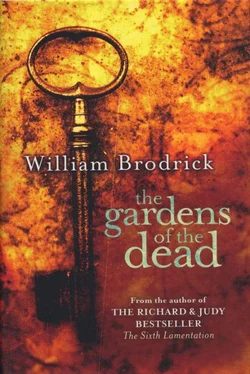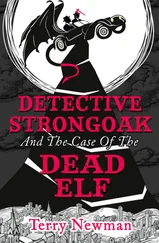William Brodrick - The Gardens of the Dead
Здесь есть возможность читать онлайн «William Brodrick - The Gardens of the Dead» весь текст электронной книги совершенно бесплатно (целиком полную версию без сокращений). В некоторых случаях можно слушать аудио, скачать через торрент в формате fb2 и присутствует краткое содержание. Жанр: Триллер, на английском языке. Описание произведения, (предисловие) а так же отзывы посетителей доступны на портале библиотеки ЛибКат.
- Название:The Gardens of the Dead
- Автор:
- Жанр:
- Год:неизвестен
- ISBN:нет данных
- Рейтинг книги:4 / 5. Голосов: 1
-
Избранное:Добавить в избранное
- Отзывы:
-
Ваша оценка:
- 80
- 1
- 2
- 3
- 4
- 5
The Gardens of the Dead: краткое содержание, описание и аннотация
Предлагаем к чтению аннотацию, описание, краткое содержание или предисловие (зависит от того, что написал сам автор книги «The Gardens of the Dead»). Если вы не нашли необходимую информацию о книге — напишите в комментариях, мы постараемся отыскать её.
The Gardens of the Dead — читать онлайн бесплатно полную книгу (весь текст) целиком
Ниже представлен текст книги, разбитый по страницам. Система сохранения места последней прочитанной страницы, позволяет с удобством читать онлайн бесплатно книгу «The Gardens of the Dead», без необходимости каждый раз заново искать на чём Вы остановились. Поставьте закладку, и сможете в любой момент перейти на страницу, на которой закончили чтение.
Интервал:
Закладка:
‘No.’
Ah.’ He sniffed. ‘It doesn’t seem right somehow If asked, I’d have said your mother would have died – if you’ll forgive the bluntness of the term – on her feet, bringing down the wrongdoer.’
‘That would have been more fitting.’
‘The East End, wasn’t it?’
‘Yes.’
‘Got family over there?’
‘No.’ Nick shifted uncomfortably ‘Why?’
‘Sorry. Silly question. That’s why I keep out of court.’
Nick backed away ‘If you’ll excuse me.’ The little man’s intense manner seemed to have filled the hall. Nick ran upstairs as if on an errand of practical importance. At the open door to the Green Room he paused. With one hand on the jamb he surveyed the familiar chaos.
This was her study Piles of paper lay scattered on the floor, held down by various paperweights – curious stones or chunks of wood picked up from the Island of Skomer. He saw her in outsized wellingtons, a torch in one hand… she cut the beam and called, ‘Hurry up.’ They’d stood and stared. He could still see the glow-worms and her eyes, wide with astonishment.
Downstairs a glass smashed. Nick stepped into the room, treading between heaps of transcripts and reports. As a child he’d always been picking things off her desk. Now he wanted to hold the fountain pen that had written those letters. By her chair, he stepped over a cardboard box and slipped; a hand flew out and he struck a line of small antique books on the desk – the kind you don’t read, but look good. He steadied himself and swore. By his foot was a dark glossy photograph, a shot of a smashed cranium, part of an autopsy report. He knelt down to gather the books. One lay open, its pages fanned against the floor. When he picked it up, a key fell out. Engraved upon it was ‘BJM Securities’ and a telephone number.
For something like ten minutes Nick sat at her desk, his mind blank. He flicked through the pages of The Following of Christ -a tiny volume by Thomas a Kempis, printed by Keating and Brown in 1829. Nick had written all over it when he was five.
She’d never said anything, as far as he could recall; but she must have noticed, even if it was years afterwards, because a hole had been cut into the text. He put the key in his pocket and left the room slowly like a man crossing a field.
Nick braved out the remaining hour or so, shaking hands and talking of Australian wildlife. When they’d all gone he tapped open the kitchen door and saw Roderick Kemble assaulting the cooker while crunching a mint. Good old Roddy in his red apron. He was swishing onions in a skillet. The cad had prepared for the moment no one had thought about. Nick leaned on the counter observing his father at the table: the jacket discarded, the rolled-up sleeves. Thin, silvery hair, usually combed back, had been ruffled. The red patches on his cheeks – a harmless liver malfunction – glowed as if he’d been slapped across the face.
He began to speak, and Nick listened, thumbing the key in his pocket. For some reason he felt like an intruder.
‘During the reception I nipped upstairs to the Butterfly Room. After a minute there was a knock at the door. Someone called Cartwright.’
Roddy banged the skillet with one hand and threw in something pink with the other. ‘She’s a police inspector.’ He tipped a bottle and threw in a match. The thing almost exploded, as in a pantomime when the genie turns up.
‘What did she want?’ asked Nick casually.
Charles searched the table, as if for crumbs. ‘She asked whether Elizabeth had been troubled by anything.’ He was ruffled and red. ‘Just kindness, you know Surprised that she’s gone the distance too soon.
Roddy banged the skillet on the cooker, as if it were a gong.
‘Plates, glasses and the amenities of joy if you please,’ he said solemnly ‘Even now, at this painful time, we cannot waver.
Nick woke in the middle of the night. He went to the bathroom for a glass of water. The mirror was too low because he was too big… that’s what his mother had said… so he stooped to look. Despite the sun, he hadn’t gone especially brown. But his skin was speckled and his eyebrows had turned to straw As if that bewildered face ought to know, he asked himself why a solicitor had quizzed him about the East End, rather than dingos; why an inspector had gone after a widower; and why a key his mother’s secret, had been kept not only from her husband, but also from him.
5
Father Andrew was fond of a saying from a Desert Father:
‘Don’t use wise words falsely’ Perhaps that explained why he was always cautious when he spoke. And why it was disconcerting when you sensed he was preparing to speak.
The day after the funeral, Anselm bumped into Father Andrew crossing the cloister. The Prior paused, eyeing Anselm with an expression somewhere between expectancy and deliberation.
‘Nice day for picking the apples,’ volunteered Anselm.
‘What?’
Anselm repeated what he’d thought was an amiable observation.
‘Eh?’ The Glasgow intonation suggested a coming scuffle.
Oh no, thought Anselm. He’s changing the community work rota. The Prior always lost a screw when he was planning to shift people from one job to another, because everyone complained. Father Andrew waited a moment and then strode off. In a flush of horror, Anselm thought of the new dispensation: he might face exile to the kitchen – a sort of limbo where no one approves of you, except on feast days. But then he settled upon the obvious: that the Prior’s ill temper was related to Elizabeth’s death, the coming of Cartwheel and… an unused key. They were of a piece. And the Prior was waiting for Anselm. He had something to say. But why not call him in? Why the glowering?
Anselm decided that he’d better go to BJM Securities sooner rather than later. First, though, he had to sift through some nagging memories that had gathered around the key Uneasily, Anselm made his way to Saint Leonard’s Field and the sweet ambience of manual labour.
The trees were already peppered with monks. Crates were stacked against a trolley Ladders and forked poles reached into the branches. There was a hum of contentment. Apple picking always did that, even when community nerves were frayed -which they had been since Cyril had started banging on about missing receipts. And Christmas was coming. That always wound the brothers up.
Anselm chose an unattended tree that was heavy with foliage. He found a wide limb, leaned back and rolled himself a cigarette. And he returned to Elizabeth’s remark about ‘not knowing and not being able to care’. It didn’t sit easily with the vociferous defender of the adversarial system whom he’d known at the Bar.
‘Look,’ she had said during one of their little chats, ‘it’s a court of evidence, not truth. We have to forget about the truth, for truth’s sake. The truth is out of reach. And we shouldn’t pretend when we stand up in court that the truth is what we care about. We don’t. We care about what our client says is the truth. I can live with that. It’s the only way to take innocence seriously when all the evidence points the other way. The truth? What’s that? It’s something the jury decided after I sat down.’
No discomfort there, thought Anselm, blowing a perfect ring. At the time, ruminating over a Jaffa cake, Anselm had baited her confidence. ‘But what if someone got off because the trial took a wrong turn and no one noticed?’
‘It can’t happen,’ she said, glancing at her watch. She was due back in court. ‘All the jury hears are competing versions of the relevant facts. Have you eaten the last one?’
‘Sorry.’
What quiet voice had seized her conscience? thought Anselm, picking an apple. And what could it seize upon? Every barrister accepted that justice was determined by winning and losing. If you lost, you swallowed disappointment; if you won, you got a pat on the back. As Elizabeth had said, ‘what really happened’ was whatever the jury decided. And if they convicted an innocent man? Unless you could fault the process or find new evidence, he’d languish in jail. And if a guilty man was freed? No one could bring him back to court. He could chant ‘Nemo debet bis vexari’ (or, to be patristic, ‘God doesn’t judge the same offence twice’). Either way the truth had gone like the dove off the ark.
Читать дальшеИнтервал:
Закладка:
Похожие книги на «The Gardens of the Dead»
Представляем Вашему вниманию похожие книги на «The Gardens of the Dead» списком для выбора. Мы отобрали схожую по названию и смыслу литературу в надежде предоставить читателям больше вариантов отыскать новые, интересные, ещё непрочитанные произведения.
Обсуждение, отзывы о книге «The Gardens of the Dead» и просто собственные мнения читателей. Оставьте ваши комментарии, напишите, что Вы думаете о произведении, его смысле или главных героях. Укажите что конкретно понравилось, а что нет, и почему Вы так считаете.












